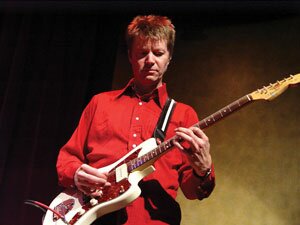CULTURE- MUSIC- Nels Cline: Refusing to get technical on us

PUBLICITY PHOTO
It's not unfair to call Nels Cline the brains of Wilco as long as we also concede that Jeff Tweedy is the heart. Ever since his induction in 2004, Cline has become a mascot of sorts and a definite fan favorite as a result of his ability to inject X-factor noisy guitar solo freakouts into the heart of Tweedy's sweetest of pop gems.
But when he's not answering to the band or to Tweedy's compositional whims, Cline also keeps busy with more outlandish projects. He's had an eponymous trio of one sort or another since the late '80s and also managed to work in occasional projects with the likes of Willie Nelson, Thurston Moore, and Jane's Addiction drummer Stephen Perkins.
But it's bands like the free jazz trio he's bringing to the Paramount that really let him spread his wings; when he talks about its guiding principles, his brainier side comes to the fore and it becomes ever more obvious that he's capable of way more than a nimble pop-rock sideman.
The Hook: How do your non-Wilco projects typically go over with the Wilco fans?
Nels Cline: Gosh, I haven't had that many opportunities to play the non-Wilco projects for Wilco fans. There's no beautiful Jeff Tweedy singing.
The Hook: Instead, you have the Nels Cline Singers, which doesn't actually feature Nels Cline singing– or any singing at all, for that matter. So what's actually the defining feature of this trio?
Nels Cline: I had another trio from '89 to '97. The reason I keep doing trios originally was to kick my own butt technically, because I didn't think I could pull it off, and also economically it's much easier to make a go of it. We combine absolute spontaneity with a high degree of discipline. That's not just good for the audience; it's good for us.
The Hook: What do you mean when you talk about discipline, exactly?
Nels Cline: Some of my compositions are pretty specific, and they require not just an ability to play an instrument, but also a fair amount of dynamic control, and also a certain sensitivity to the harmonic vocabulary. That's where the discipline comes in– listening, and not just waving your arms. I find that a lot of fusion guitar doesn't have a whole lot of dynamics.
The Hook: Fusion, eh? That's such a funny word.
Nels Cline: I don't really have an aversion to the term, because I'm 52 years old, and it was born out of music that I was highly influenced by: Miles and Herbie Hancock. Fusion now comes from instrumental R&B like Grover Washington Jr., or from classic rock chops, like Return To Forever or Weather Report– groups that show a certain athletecism.
The Hook: Kenny G is staring at you from the page next door. What would you like to say to him?
Nels Cline: It's obvious that to many people, Kenny G has ruined soprano saxophone for the musical lexicon– the whole thing he did with the Louis Armstrong duet that Pat Metheny ended up raging against. I'd like to think of him as the Herb Alpert of our day– those were huge instrumental hits. And I'm into instrumental hits, but I'm a little disappointed that it has gone the Kenny G route, because it doesn't do anything for me. It goes back to the fusion– there's a certain kind of fusion that goes back to instrumental R&B– there's a certain kind of music that people listen to as the background to their fancy lifestyle, or to aspire to their fancy lifestyle, of that you put on to impress: "Oh, this sounds really good on my fancy stereo."
The Hook: You got to rock before jazz. Was it intellectually difficult for you to cross over?
Nels Cline: Coming into it as a teenager, I didn't know anything about it, and my introduction was completely happenstance. I don't think I ever understood bebop and chord changes and all that.
The Hook: I read in another interview that you covered a Coltrane record strictly as a reaction to the Marsalis movement.
Nels Cline: Late Coltrane was being seen as a mistake, and we just wanted to say that free jazz was important to us, and risk being loathed. We thought we'd be quite vilified for it, but we got nominated for some international award.
The Hook: You've said that this project is equally about both free improvisation and structured composition. How do they interact? Do you like doing structured improvisation, or do you feel like you're just regurgitating licks?
Nels Cline: There's all kinds of doctrine about free versus composed, but I just categorically ignore all that– I don't have some sort of doctrine about "free." You'll find that some of the greatest free improvisers use compositional and structural parameters and don't just get up there and do whatever. We have enough stuff that we don't get up there and play the same set every night; it's a complete mix, and that way it keeps all of us engaged and keeps the audience fascinated and on its toes.
The Hook: You're an emotionally driven player, but in many cases jazz is a highly technical form of music. Do the two ever conflict? Do you have to come back from the trance to nail the key change?
Nels Cline: I think that the balance between consciousness and complete immersion is a mystery, but it's definitely what I'm about. Maybe it's emotionally satisfying to make that weird chord change?
Nels Cline performs at the Paramount Theater June 6 at 8pm. It's a bargain at $25.50, but recommended for only the bravest of Wilco fans.
#
1 comment
Great interview. Nels Cline challenges all of us to return to the well of music to drink anew.